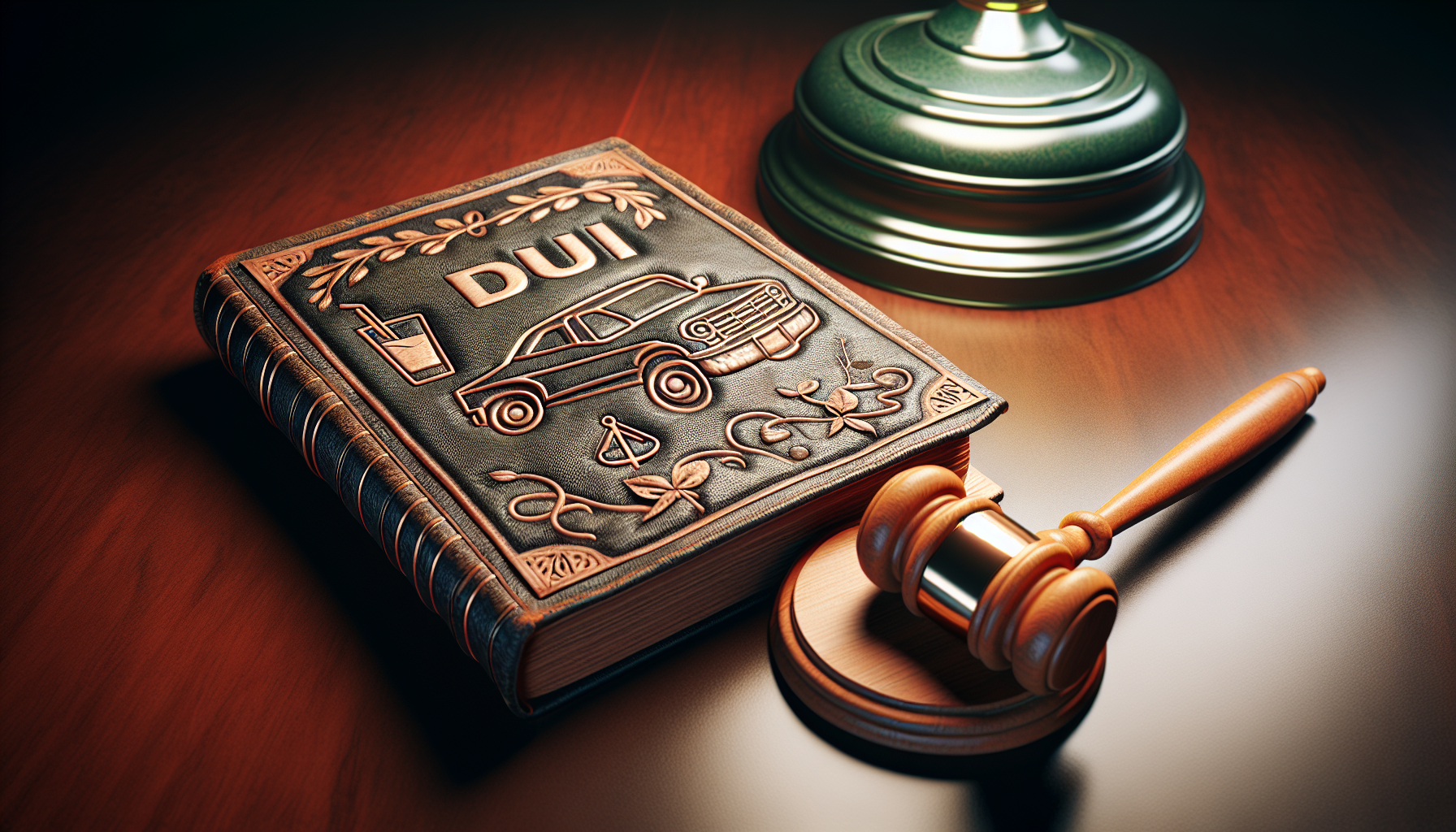Crafting a defense strategy for DUI charges is essential. This guide will walk you through the steps to craft a defense strategy, from understanding the charges to preparing for court. Get the insights you need to build a strong defense.
Key Takeaways
- Understanding the detailed aspects of DUI charges, including legal BAC limits and implied consent laws, forms the foundation of an effective defense strategy.
- Taking immediate steps after a DUI arrest, such as invoking your right to remain silent, requesting a hearing, and contacting a DUI lawyer, is crucial to protecting your rights and driving privileges.
- Building a strong defense involves gathering and scrutinizing all evidence, challenging sobriety tests and probable cause, and potentially leveraging expert witnesses to strengthen your case.
Understanding DUI Charges

Understanding the complexities of DUI charges is the first step in crafting an effective defense. DUI, DWI, and OVI are terms frequently used to describe the act of driving under the influence, driving while impaired, and operating a vehicle under the influence, respectively. Each term reflects minor differences in legal definitions, but they all point to the same core issue: impaired driving.
In Utah, the legal blood alcohol concentration (BAC) limit for a DUI charge is 0.05 percent, a stricter limit compared to many other states. Utah DUI laws also state that for drivers under 21, even a detectable amount of alcohol can result in a DUI charge. Adding to the complexity, Utah law allows for DUI charges even if the driver is not actively driving but is found in control of the vehicle while under the influence.
The state’s implied consent laws mandate that drivers arrested for DUI must submit to a breath or blood test, with refusal leading to license suspension. Grasping these nuances is fundamental because they shape the base of your defense.
Initial Steps After a DUI Arrest
The moments following a DUI arrest are critical. First and foremost, invoke your right to remain silent to avoid self-incrimination. This step safeguards against your own words being used against you in court.
Next, promptly request a hearing with the driver’s license division within 10 days to prevent your license from being suspended. Additionally, check in with the court within 5 to 14 days to avoid a warrant being issued. Adhering to these procedural steps helps maintain your driving privileges and meets legal requirements.
Above all, it is imperative to get in touch with a DUI lawyer without delay. While it’s possible to navigate a DUI case on your own, having a professional can make a significant difference. A skilled DUI defense attorney can challenge the legality of the traffic stop, question sobriety tests, and introduce crucial evidence. Making that first call to a lawyer can set the tone for the rest of your case.
Evidence and Details for your DUI Case
Any DUI defense significantly relies on evidence. Start by obtaining a copy of the police reports related to your arrest, which can often be requested online or picked up from the local police station. These reports contain critical details about the incident and the officer’s observations.
In addition to police reports, the evidence in a DUI case can include officer testimony, video recordings of the arrest, and results from standard field sobriety tests. Scrutinizing these reports can reveal discrepancies that may be useful in negotiating reduced fines, charges, or sentences.
Breathalyzer results also constitute a key piece of evidence. Analyzing these results for discrepancies or issues with the device’s calibration can create doubt about their credibility. Similarly, chemical tests like blood and urine tests should be examined for any potential mishandling or errors, which can lead to inaccurate outcomes.
Remember, in a DUI arrest, suspects are required to submit to chemical tests that examine biological samples such as breath, blood, or urine. An in-depth examination of all this evidence, including the breath alcohol test, contributes to a robust defense.
Challenging Sobriety Tests

Field sobriety tests (FSTs) are designed to document specific intoxication clues rather than determine a pass or fail outcome. These tests, such as the Horizontal Gaze Nystagmus, Walk and Turn, and One Leg Stand, are scientifically validated if administered correctly. However, their reliability can be challenged, especially in drug DUI cases, where they have not been validated for assessing drug intoxication.
Common errors in administering FSTs include starting too early, using arms for balance, or incorrect pivoting. These errors can be leveraged to discredit the results. A skilled DUI attorney can expose weak scientific validation and improper administration, thus undermining the prosecution’s case.
Disputing these tests’ results can undermine the prosecution’s argument and reinforce your defense, rendering it a pivotal element of your strategy.
Questioning Reasonable Suspicion and Probable Cause
Reasonable suspicion and probable cause are two legal standards that play a pivotal role in DUI cases. Reasonable suspicion allows officers to temporarily stop and detain a motorist if they believe a crime may have been committed. This can be triggered by behaviors such as erratic driving, illegal turns, or the smell of alcohol.
However, an officer needs to meet the higher standard of probable cause to make an arrest. Investigating the arrest procedures can reveal deviations from standard protocols or rights violations, potentially weakening the prosecution’s case.
A detailed examination of the reasons for the traffic stop and the ensuing arrest can enable your defense to argue the officer’s lack of reasonable suspicion or probable cause. This could result in the suppression of evidence or even the dismissal of charges.
Suppressing Illegally Obtained Evidence
A motion to suppress is a powerful tool in a DUI defense arsenal. This pre-trial legal argument requests the judge to exclude specific evidence or dismiss the entire allegation if it was obtained in violation of the defendant’s rights.
Common reasons for filing a motion to suppress include lack of probable cause for the arrest and failure to provide Miranda rights. If the motion is granted, the prosecution cannot introduce the suppressed evidence at trial, which can significantly weaken their case.
During a motion hearing, your defense attorney can cross-examine the arresting officer under oath to uncover any procedural missteps or rights violations. Successfully suppressing illegally obtained evidence can often lead to a favorable outcome in your case.
Building a Strong Defense Team
Having a strong defense team is paramount in a DUI case. An experienced DUI defense lawyer will:
- Aggressively fight for your rights
- Help you avoid severe penalties such as jail time and fines
- Bring knowledge, experience, and a solid reputation to your case
Finding the right lawyer is critical to avoiding a license suspension. The right lawyer can also help in minimizing fees and penalties. Top DUI defense lawyers are selected based on scores across more than 25 variables analyzed in five categories. Look for a lawyer with an exemplary track record who offers personalized attention, ensuring they can answer questions and address concerns throughout the DUI case. Considering the DUI lawyer’s cost is also essential when making your decision. Among the available dui lawyers, choose the one that best fits your needs and budget.
Developing a comprehensive defense strategy alongside your attorney, who provides legal assistance, is vital. This strategy should focus on the details of your arrest and potential legal issues, giving you the best chance for a successful defense.
Leveraging Expert Witnesses
Expert witnesses can significantly impact a DUI case. Forensic toxicologists can testify about the effects of alcohol or controlled substances on driving impairment and the technical details of maintaining blood samples. Field sobriety test experts can educate the jury on the proper administration of these tests and identify any non-standardized tests used.
Accident reconstruction experts analyze the causes of traffic collisions, which can be crucial in DUI cases involving accidents. Additionally, breath alcohol testing experts can testify about medical conditions like GERD that may affect breathalyzer test results.
Leveraging these witnesses’ expertise can provide a robust challenge to the prosecution’s evidence and significantly strengthen your defense.
Exploring Plea Bargains
A DUI plea bargain involves negotiating a deal where the defendant pleads guilty to a lesser charge or accepts reduced penalties to avoid a full trial and potentially a DUI conviction. This can lead to benefits such as shorter license suspension, lower fines, and reduced jail time for DUI offenders. One expected outcome of a plea bargain is reducing the charge to a ‘wet reckless’ offense, which carries less severe penalties than a DUI.
However, accepting a plea deal requires admitting guilt to some extent. Understanding the terms and conditions, including the specific concessions and benefits, is paramount. Consulting a criminal defense attorney is crucial when considering a plea bargain, as they can explain the terms and help negotiate the best possible deal.
Avoiding a trial through a plea bargain provides a clearer picture of the consequences, reducing the stress and uncertainty associated with court proceedings. We offer a free consultation to further assist you in understanding your options.
Preparing for Court
Court preparation requires meticulous attention to detail. Start by gathering all relevant documents such as:
- Police reports
- Breathalyzer results
- Witness statements
- Medical records
These documents form the foundation of your defense in civil litigation and are critical for your law firm to build a strong case.
Attend all court dates on time, be respectful, and dress appropriately to make a good impression. Cooperate fully with your attorney and provide all relevant information to aid in your defense. Your behavior and preparedness can significantly impact the outcome of your case.
Adherence to these steps ensures thorough court preparation and enhances your prospects of a favorable outcome.
Post-Conviction Strategies
Even after a conviction, there are strategies to mitigate the long-term impact of a DUI. Expunged DUI records can still be accessed by certain organizations, including the Board of Pardons and Parole and federal authorities. The Bureau of Criminal Identification (BCI) can also use these records when deciding on concealed firearm permits.
Planning for possible outcomes like fines, mandatory classes, community service, license suspension, or jail time is vital when dealing with a serious offense. Understanding these potential outcomes helps you prepare for the future and take necessary steps to comply with court orders.
The BCI can maintain expunged DUI records but are not released to the public without a court order. Knowing this can help you navigate the post-conviction landscape more effectively.
Summary
Crafting a defense strategy for DUI cases involves understanding the charges, taking immediate post-arrest steps, gathering and analyzing evidence, and building a strong defense team. Each step is crucial in ensuring the best possible outcome in your case.
Remember, the journey doesn’t end at the court’s verdict. Post-conviction strategies are equally important in managing the long-term consequences of a DUI conviction. By staying proactive and informed, you can navigate the complexities of DUI charges and work towards a brighter future.
Frequently Asked Questions
What is the legal BAC limit for a DUI charge in Utah?
In Utah, the legal BAC limit for a DUI charge is 0.05 percent. It’s important always to drive responsibly.
What should I do immediately after a DUI arrest?
After a DUI arrest, it’s essential to stay silent, request a hearing within 10 days, and contact a DUI lawyer immediately. These steps are crucial to protecting your rights and navigating the legal process effectively.
How can I challenge field sobriety test results?
You can challenge field sobriety test results by highlighting any weak scientific validation and improper administration by officers during the test. Good luck!
What is a DUI plea bargain?
A DUI plea bargain is a negotiation where the defendant pleads guilty to a lesser charge or accepts reduced penalties to avoid a full trial, offering the opportunity for a more favorable outcome.
What are some post-conviction strategies for a DUI case?
After a DUI conviction, it’s essential to consider the implications of deleted records, plan for potential fines, mandatory classes, community service, and license suspension to move forward positively and responsibly.



